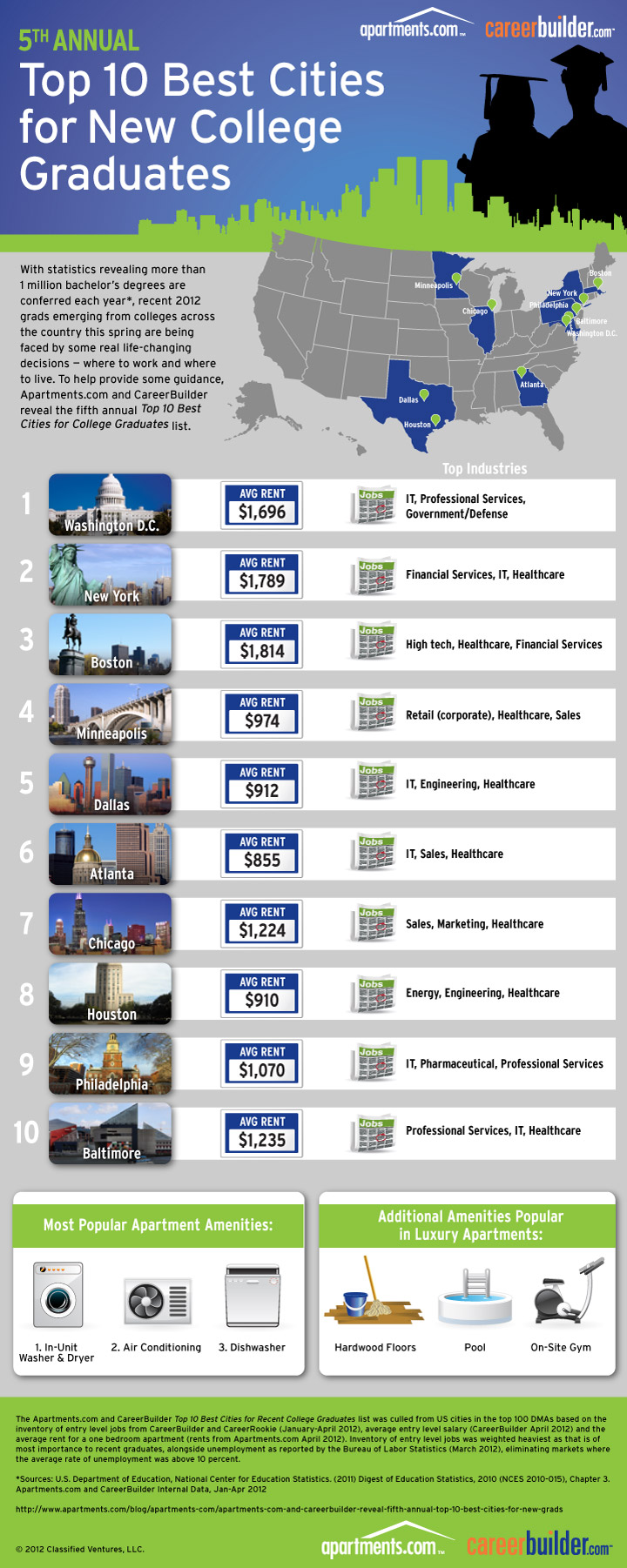 It’s the early part of summer and college graduates are flocking to their new jobs in new cities. I can remember living in the DC area and seeing a fresh crop of grads each spring with that “I’m going to change the world” look in their eye. This happens across many cities in the US, but it’s important for any young professional to see how a career opportunity in the right city may also impact the financial strain of living in that city.
It’s the early part of summer and college graduates are flocking to their new jobs in new cities. I can remember living in the DC area and seeing a fresh crop of grads each spring with that “I’m going to change the world” look in their eye. This happens across many cities in the US, but it’s important for any young professional to see how a career opportunity in the right city may also impact the financial strain of living in that city.
To give everyone a good idea of how the cities stack up, CareerBuilder and Apartments.com have come out with their annual list of the “Top 10 Best Cities for Recent College Graduates.” The list includes cities new grads often target for employment, but any young professional looking to make a move can get something from this list. CareerBuilder and Apartments.com pulled this list together, taking into account employment opportunities, salary and rent for a one bedroom apartment.
Personally, I have lived in some of these cities, and they all offer something different. In some cases, there are many job opportunities, so you can get settled in the area, even if you switch careers along the way. Other cities attract certain industries, so career flexibility may not be there. “When starting out, it can be tempting to focus on only one aspect of a city,” said Tammy Kotula, public relations and promotions manager for Apartments.com. “However, it’s important to carefully evaluate a variety of options before choosing where to settle down. The first step should be identifying cities that offer the most professional opportunities while affording you a lifestyle you can enjoy. If you relocate to an area of the country with high apartment occupancy, you may find yourself paying more in rent in response to a competitive market. However, if this same city offers a wealth of opportunities for your career, you may find it’s something that evens out. It is tough decisions like this that have motivated the teams at Apartments.com and CareerBuilder to collaborate and generate this list that measures job opportunity, average salary and rent.”
Whether you are a new grad or a twenty-something looking for a change, making a move is a huge decision. Ideally, you can make a move with a job already in hand, but if not, then it is important to think about the job prospects in that city…in addition to how much it will cost you to job search from there. While more than half of employers (54 percent) surveyed by CareerBuilder reported they plan to hire recent college grads in 2012, up from 46 percent last year, the competition for jobs is still stiff in this recovering economy.
“While the competition remains tough, job prospects for recent college graduates have improved this year,” said Michael Erwin, director of Corporate Communications for CareerBuilder. “Job listings on CareerBuilder are up across industries and company sizes. The key is pinpointing those markets that not only have the greatest demand for your skill sets, but match areas of interest.”
No matter where you move, or if you move many times early in your career (as I have done), you have to think about your budget and what you want from a city. Even if Ramen becomes your main dinner staple, trying out New York or DC early in your career may give you the chance to meet people, expand your career, and learn about budgeting. As you get older, you may find that you want that mix of city and sprawl, so Dallas might be right. At the end of the day, you have to know what you want and make the numbers work.
Apartments.com and CareerBuilder created a full list of 15 cities which can be found here. The “Top 15 Best Cities for Recent College Graduates” list was culled from US cities in the top 100 Designated Market Areas based on the inventory of entry level jobs from CareerBuilder and CareerRookie (January-April 2012), average entry level salary (CareerBuilder April 2012) and the average rent for a one bedroom apartment (rents from Apartments.com April 2012). Inventory of entry level jobs was weighted heaviest as that is of most importance to recent graduates, alongside unemployment as reported by the Bureau of Labor Statistics (March 2012), eliminating markets where the average rate of unemployment was above 10 percent.




